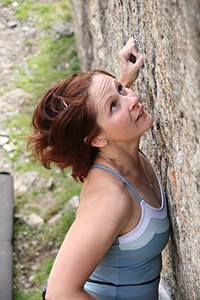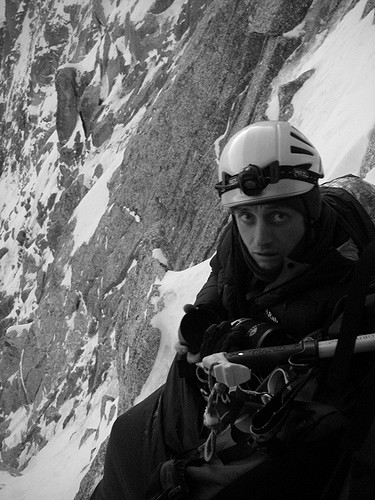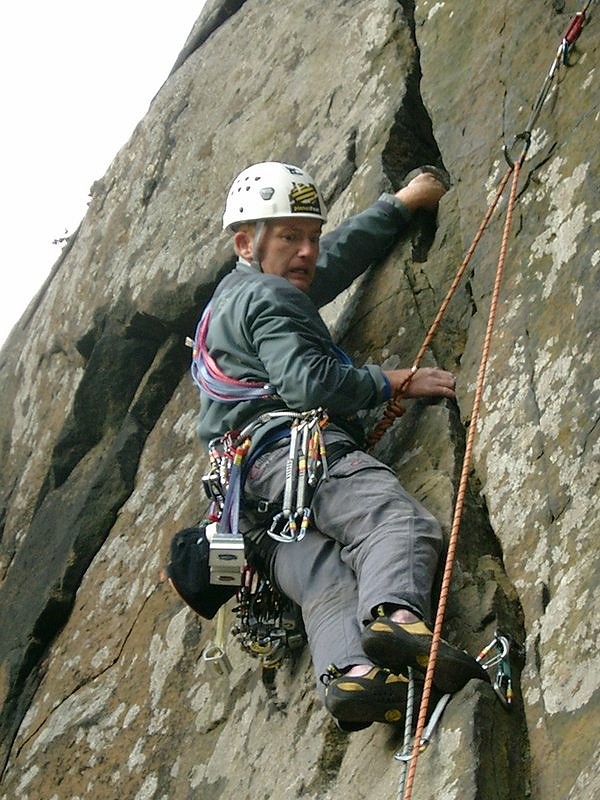

Improved gear, knowledge of nutrition and training cycles are also now not the only weapons at the disposal of the modern climber. Psychology it seems is everywhere, and appearing in the media are innumerable experts promising to help you turn your anxieties and fears into nerves of steel, accompanied by a library's worth of self help manuals and web articles. But as psychological therapies are as yet a totally unregulated profession, how do you know that the person and the approach you choose are the real thing? The answer to this question is complex given the volume of information available on the web. Here I attempt to take you through the minefield that is psychological research to help you pick an approach that's right for you and which has some sort of evidence base to it.
1. What's the problem?
First of all, be clear what it is you want help with, as if you are not clear it will be hard to find the advice you need in a manual and you may well be better off going to see someone who can help you figure it out. Are you struggling to stay motivated? Do you know how to prepare yourself mentally for a climb and how to improve your chances of success? Do you keep climbing yourself into dead ends because your planning skills are poor? Are you struggling to stay focused when on a climb?
Fears and anxieties need even more careful consideration and a little bit of self-analysis. Do you have a lot of negative self-talk going on which interferes with your movement (eg “my hands are sweating, I can't do slopers, I couldn't do this route last time I tried”)? Do you have an overwhelming and disproportionate fear of falling (eg fear of falling on a dangerous route is justified, but on evenly spaced bolts?). Do you globalise your difficulties on a route (eg “I'm a shit climber, I'm just shit”).
Perhaps even more difficult to answer and requiring a greater degree of self-honesty is the question, why do you climb? Sometimes our motivations, which fuel us at the start of a climbing career, can return to haunt us later on. For example many climbers feel that they are overcoming something or proving something by climbing, which can be very motivating and empowering initially, but unless you are super talented, there will come a point where you can no longer overcome or prove something simply because you cant climb any harder, and the weight of expectation then becomes an double edged sword.

Problems with planning, preparation, concentration and motivation:
Visualisation is a key component to many athletes training and involved mentally running through what you are about to climb in detail (sights, feel, smell etc) as you want it to be. In reality people tend to try to hurry this through, skipping details or getting distracted by thoughts about the “what ifs”. It is a skill which requires practice, and is somewhat harder in climbing than in other sports because often you will be on sighting. However there are ways to train yourself to do this. Bouldering is a really useful activity because of the shorter sequences involved and the fact that you can usually see most of the moves. Complete a problem within your capability, then immediately afterwards rehearse it in your mind's eye, trying to capture it with all your senses, and repeat the process. The more you climb the more familiar you will become with the holds of particular rock types and how you need to move to complete the moves. Re-rehearsing after a climb and then repeating it can help you begin to tune up for planning your on sight. If you are wanting to on sight something near your limit, spend time in the immediate area on climbs with similar moves or just getting a feel for the sights and sounds you will come across when you make your attempt. This will help you enrich your mental imagery, and you should practice visualising a successful climb for as many weeks as possible before you make your attempt. There is good research evidence from athletics and in particular gymnastics that the most successful athletes are those who spend almost an equal amount of time in mental rehearsal as in physical training.
Motivation does peak and trough and it is important to be clear about goals and why you have chosen those particular climbs. However, be wary of setting yourself absolute targets such as completing a climb, as focusing on an end point rather than a journey or the climb itself can leave you feeling empty if you complete it or demotivated if you don't. Spending time thinking in specific detail about your successes (rather than what you didn't do well) can promote a sense of satisfaction and well being which makes you more likely to want to go out and do it again. This probably sounds contrary to popular opinion which has it that adversity makes you hungry and more likely to work at succeeding, but research shows that in actual fact, feeling a sense of achievement and not ignoring but minimising time spent ruminating over what you cant do will improve performance.
Fears and anxieties:
Clinical psychologists have a long history of working with fears and phobias and there is good research evidence to help you match up specific approaches to specific fears. For example, behavioural approaches such as exposing yourself to the thing that frightens you (eg practising falling off if that's what terrifies you) in incremental stages and doing so regularly will help you recondition yourself. However, in practice many people find that going straight into exposure can be too difficult. If this is the case, then approaches such as imaginal exposure to the feared situation during a relaxed state, either under hypnosis or just relaxation can be helpful. Cognitive behavioural techniques (CBT), which aim to tackle unhelpful thoughts and undermine the evidence for them through behavioural experiments, can also be helpful and has been proven successful. For example, perhaps your self talk goes along the lines of “this is hard, this is too hard, I can never do overhangs” etc etc, then the approach would be to gather evidence to the contrary of this, eg record times when you have climbed harder and successfully completed overhangs. You would then spend time practising more helpful self talk so that you can access this in your anxiety-provoking climbing situations. A related but different approach is neurolinguistic programming (NLP), which also aims to change unhelpful patterns of thinking, where you may use anchoring techniques in different sensory modalities to replace anxiety with relaxation, eg place a sticker on the back of your hand for you to look at when you feel anxious, which you have previously looked at whilst practising relaxing. This and other elements of the approach may work well for some people, but at present there is little empirical evidence to suggest its benefits are greater than those achieved for example through CBT or behavioural methods.
Mindfulness and acceptance based approaches are a relatively new phenomenon in terms of the research literature with a growing evidence base. They both have their roots in eastern philosophies and contend that it is the struggle we engage in to control our thoughts that gives them the destructive power and hold they have over us. Its certainly possible to see that if you try to tell yourself not to think about pink elephants for long enough then you will find it impossible not to think about pink elephants, and the same happens with anxiety. If we continually fight our feelings then we actually strengthen them. The trick here is to acknowledge that thoughts are just thoughts and let them slide away, returning our focus to the here and now. Mindfulness techniques are essentially meditative, but don't require sitting in a quiet place and chanting. Rather, we allow ourselves to be fully present in the moment, connecting with all our sensory experiences. This can be particularly helpful when climbing as attention to all elements of the sensory experience can improve performance. For example, noticing areas of tension and relaxation in our body can ensure the right amount of force is used at the right time and place; paying close visual attention to the rock in front of us can help us spot hidden variations which allow for better positioning, and so on.
3. I've tried this stuff before and it doesn't work for me!
This may well be true, as research is done on groups not individuals, and whilst we can easily see the path of a waterfall, we can't predict the exact journey of a single molecule of water within the fall, and so it is for people. However, in order to access your new skills in situations of high stress which climbing gives you, they have to be well practised. The real question to ask yourself perhaps is not have I trained hard enough, but have I really given equal weight to the psychological and physical aspects of my training?
Other Related UKC Articles:
Building Steps Off The Plateau - VS to E1 - Mental Training by Cider Nut
Training - Why Bother? by Simon Lee
Thanks to James Thacker (www.jamesthacker.co.uk) and 'The Shamen' for use of the photo's.


Comments